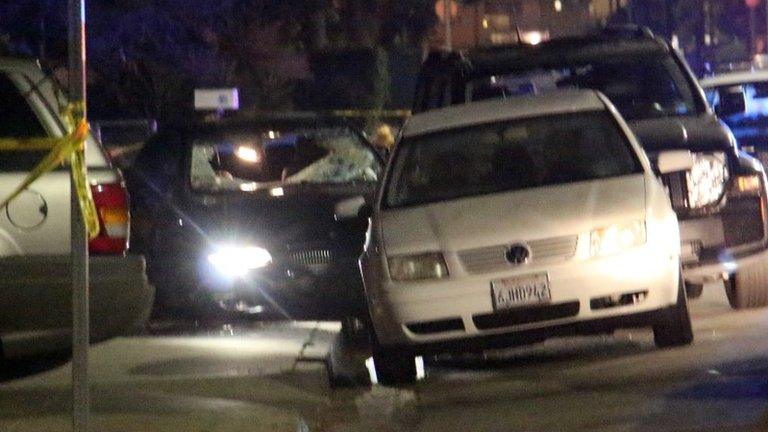Gun raffles entice US voters
- Published
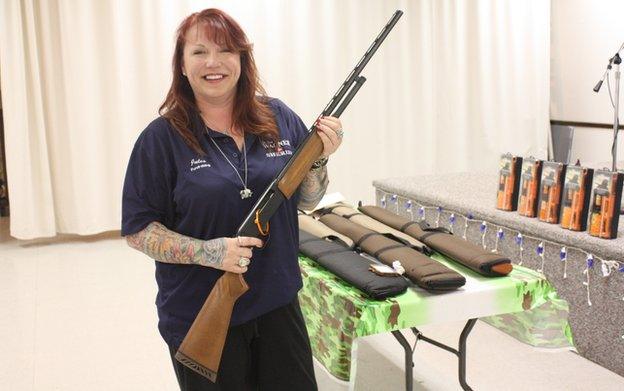
Jules Rowland shows off the fifth-place prize in the gun raffle
Gun sweepstakes have been a feature of life in parts of the US for years. But now elected officials offer guns as prizes for prospective voters.
There are all the trappings of a normal raffle draw; a tombola drum filled with tickets and a table where the prizes are proudly laid out on display. But instead of the usual fare of food hampers or boxes of chocolate, the owners of the winning tickets stand to gain a new gun. The grand prize is a Remington 870 Wingmaster 12-gauge shotgun with gold inlay. Four other firearms are also up for grabs.
The raffle is part of Steve Wagner's campaign to win the Republican primary for Sheriff of Hendricks County in Indiana. Tickets cost $10, and the winners must pass a background check at a local gun shop before collecting their prize.
"It's a very popular notion in this country that the guns are in danger," Wagner says. "By raffling off these five shotguns in a very public way there is no doubt about my commitment to the right to keep and bear arms."
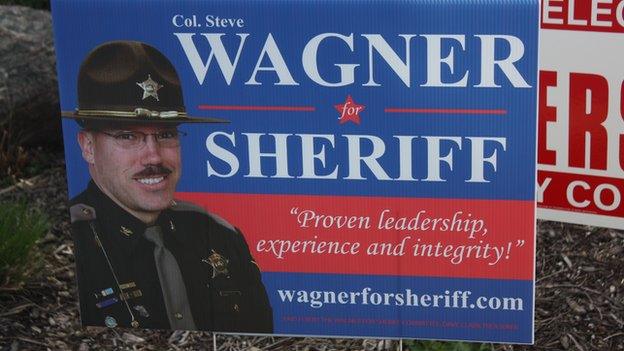
Steve Wagner says a gun raffle would both raise money for his campaign and make clear his commitment to the Second Amendment
Gun owners are an important constituency in this competitive primary. Wagner estimates that guns are kept in around 80%-90% of homes in Hendricks County.
He says the attempt by the Obama administration to bring in new firearm controls has made people more pro-gun than ever.
"In our Sheriff's department we used to process an average of 20 gun permits a month. In recent years that number has shot up to 300 a month," he says.
Over slices of pizza and glasses of ice tea, people at the raffle agree that guns are part of the fabric of life in this area.
"We grew up on farms. We hunted for sport and sometimes for food. Guns are very much a part of the American culture," says Wagner's campaign manager, Ron Sparks.
"This country was nothing but a wilderness, and you dared not go out into the wilderness unarmed."
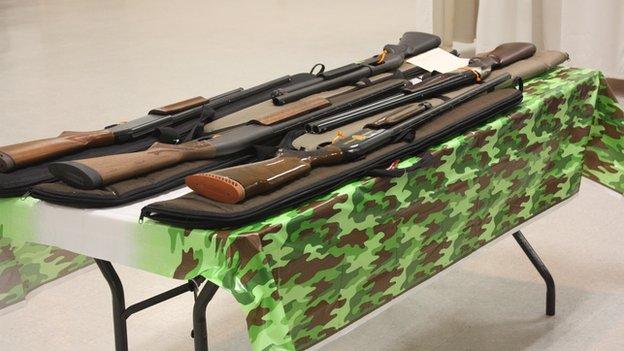
Winners must pass a background check before they can claim their prize
But now that the US has moved beyond its frontier days, many argue that more gun controls are needed to prevent the type of mass shooting seen at the Sandy Hook elementary school in 2012, when 20 children and six staff were killed. That crime inspired President Obama's attempts to tighten gun restrictions
"If more people were armed, there would be less crime," says Sparks. "The problem is that if the citizens don't have guns, the criminals will always find a way to get them."
Gun giveaways have featured prominently in many Republican primary races around the country this year. In Colorado, gubernatorial candidate Tom Tancredo raffled off an AR-15 semiautomatic rifle. Joe Carr, a tea party challenger for a US Senate seat in Tennessee, offered his supporters the chance to win a Beretta pistol.
Lee Bright, who is running in the Republican primary for the US Senate in South Carolina, found his first gun giveaway was so successful that he held two more. Five thousand people entered each competition.
"It undoubtedly has helped us reach voters we wouldn't otherwise have reached. People here are sick of being browbeaten by liberals and the media about guns; when somebody like Lee Bright comes along and shows that he supports their second amendment rights they are very drawn to him," says his campaign manager, Michael Stevens.
"We've picked up a lot of support as a result." .
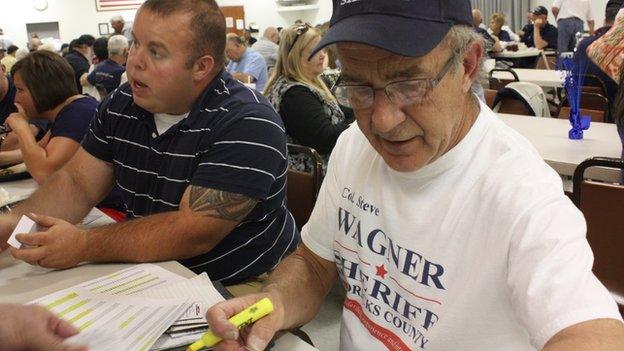
Tickets were $10; people participated both for the chance to win a gun and to make a political point
The concept is not new. The National Rifle Association has been holding gun sweepstakes for years. But John Hudak, an expert in political campaigns from the Brookings Institution, says that Republican candidates have only recently started using the tactic.
"The gun issue evokes existential passions on both sides, and that's the point of the gun raffle," he says.
"It's to incite emotion, to point eyes to a candidate that would otherwise be unable to capture that kind of attention, and that's what makes them an effective campaign tool."
At the raffle in Hendricks County, five winning tickets have been plucked from the tombola drum. One of them belongs to Jules Rowland's brother.
"He'll be really happy," she says. "He's a hunter and he'll be glad to add a new gun to his collection."
But for some taking part is a chance to make a political statement. Sitting at a trestle table among of group of friends, Linda Peterson says, "You've got to understand that this isn't about the guns. The government is sticking their thumb in our eyes. Americans are starting to say 'One more regulation that takes away our freedom and we're going to do what you tell us you can't.' If they said we don't want you to have cotton candy, we'd have been raffling cotton candy."
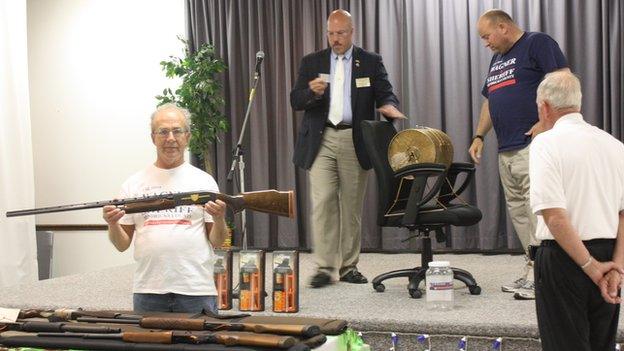
Candidate for sheriff Steve Wagner picks the winning raffle ticket at a campaign fundraiser
For people in this rural county, President Obama's attempt to introduce modest gun controls - currently stalled in Congress - is just one of his policies they vehemently oppose, from healthcare to the economy. The gun raffle is not just a campaign tactic, it's also a protest, a symbol of the anger and frustration that many conservative Americans feel about the changes in their country.
- Published20 December 2012
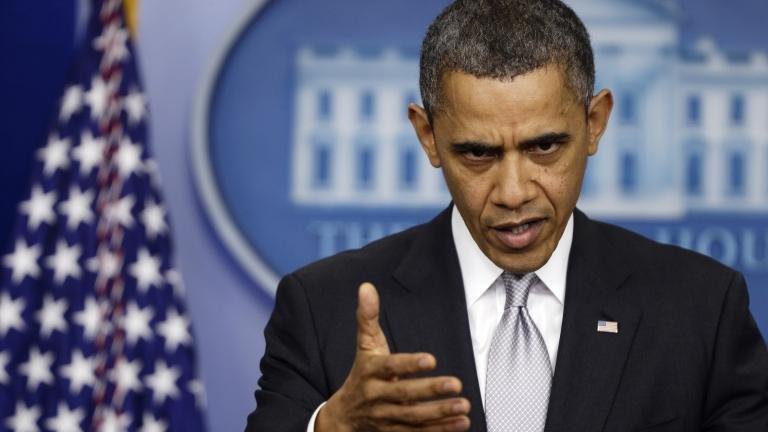
- Published24 May 2014
